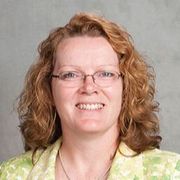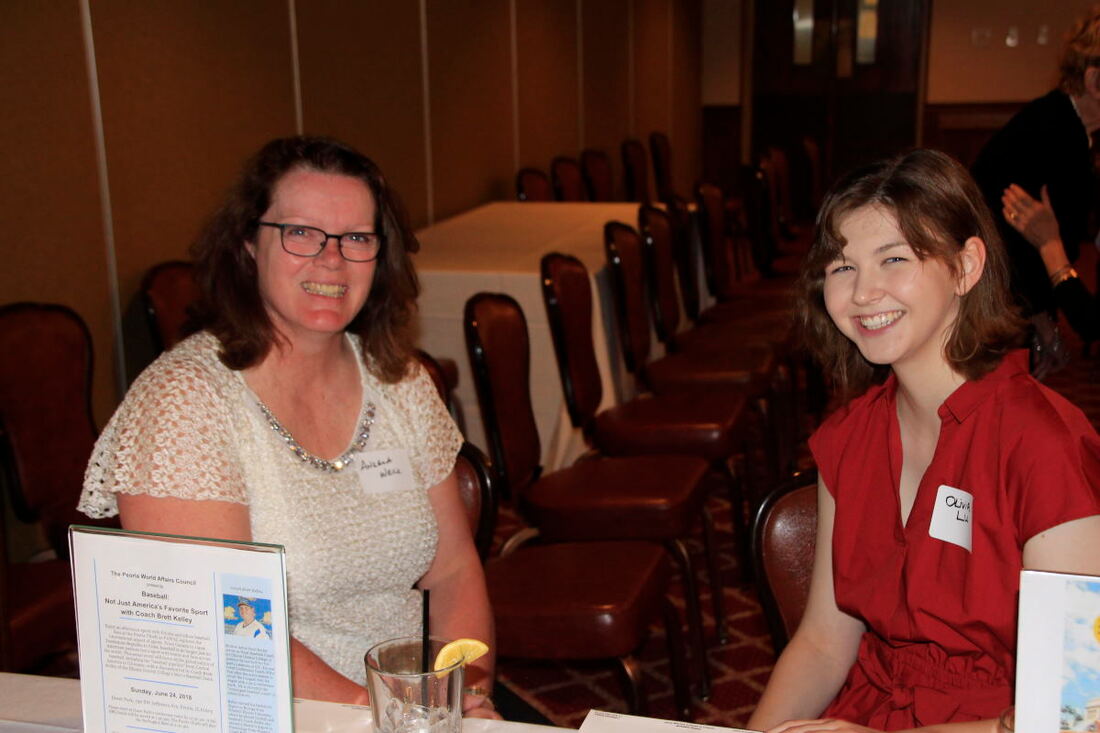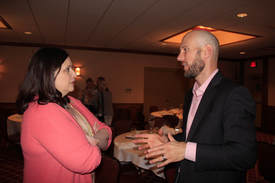7/10/2018
|
Angela Weck has been teaching at Bradley University since 1993. She primarily focuses on Russian history and international studies. She has been involved with the Peoria Area World Affairs Council since 1991, serving in various capacities until becoming the Executive Director in 2000. She stepped down from those duties 2015-2018, but returned to the position just recently.
?
PAWAC: Thanks for joining me here, Angela. How does it feel to bear the mantle of Executive Director again?
|

Angela Weck, Executive Director
|
Angela Weck: I am filling a lot bigger shoes than previously! Kristin McHugh, the person who took over betwee 2015-2018, really improved the professional nature of the organization. I find myself in awe of her efforts, and I want to be certain to continue her forward progression.
PAWAC: What motivates you to dedicate so much of your time to the organization?
Weck: I am passionate about global education. We tend to be insular here in Central Illinois. I feel motivated to make sure we all strive to understand the world around us, and how what happens there affects us here, and how what we do here affects them there.

Angela Weck handles registration with intern Olivia Lu at a recent event.
|
?PAWAC: It's no secret that PAWAC is now investing in having an intern to assist you in your duties. Can you tell me about your vision for interns for the organization?
Weck: There are many talented students at Bradley University, and experiential learning in international affairs is tough to acquire in Central Illinois. Working with PAWAC will give students the opportunity to gain global exposure while staying right here in Peoria. On the flip side, this is not all altruism! PAWAC will benefit from the fresher perspective of students, not to mention utilizing their social media skills and less inhibited approaches to "thinking outside the box."
|
PAWAC: You hosted a Critical Review Social at your house in May, where you and other board members sought membership opinions. While our programming was widely praised, members noted that we are sometimes too "Eurocentric." How do you respond to that?
Weck: I would point out that, over the course of the year, we make a serious attempt to move around the world with our programming. It may seem like the "big programs" are Eurocentric, but PAWAC works hard to cover the rest of the world in one way or another. The other side of this issue is attendance and costs. It is true that more people attend programs focused on the northern hemisphere, and so the organization has to consider finances when we select programming topics. That's where the "big programs" vs. "small programs" disparity comes into play.
PAWAC: Our country has become extremely polarized politically, but PAWAC is a non-partisan organization. How do you ensure that people of all perspectives are represented in PAWAC? Do you believe that PAWAC leans too much to one side of the aisle?
|
?Weck: It is a hard and fast rule that PAWAC will not host a speaker who will not take questions from the audience. In fact, we won't even supply questions to a speaker in advance. This rule is the foundation of PAWAC's non-partisanship. And we have rejected speakers who will not accept this foundation, even elected officials! It is true that, individually, our speakers hold strong views. But it is also true that our members and participants hold strong views, including me. PAWAC has always been an organization that entertains all points of view in open, civil discussion. I have said many times, with growing pride, that we remain that place where people can agree to disagree, and still part as friends and with greater understanding of the issues for having that open, civil discussion.
|

USAID officer Bart Pogue answers questions from the audience about development in Guatemala.
|
PAWAC: What is your vision for PAWAC? Where do you see us three years from now as a community?
Weck: PAWAC is working hard to expand its partnerships with various entities in the community. We already enjoy strong ties to Bradley University, Illinois Central College, and Eureka College. But we would to see how to grow our ties to the ethnic groups in the region, businesses with international connections, religious groups, and travelers of all sorts. We also need to grow our membership, supply volunteers to reach out to all these groups!
PAWAC: That sounds like a great step forward for the organization. Final question: we have a lot of exciting upcoming programs. Which one are you looking forward to the most?
Weck: I have to admit I have a soft spot for Lebanon. Ever since the Celebrate Lebanon! program from 2010, I have dreamed of visiting! I am looking forward to seeing how we can grow the relationships between PAWAC and the Lebanese American community and all the associated possibilities!
PAWAC: Thank you for your time, Angela. As always, it's a pleasure to speak with you.
Weck: Thank you. ?